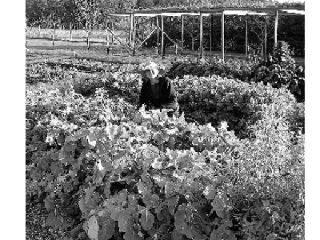For all of us who grow vegetable gardens, the New Year is a good time to pause and consider why we choose to spend our time planting and harvesting food. There’s the food, of course, but as a sampling of Lopez gardeners reveals, there’s also a sense of self-reliance and most of all there’s the garden itself.
But first to the food: “The obvious reason to grow a vegetable garden is to have fresh and delicious organic produce, especially the types that are either highly perishable (raspberries, lettuce) or mysteriously expensive (leeks, artichokes, kale). Be careful, though—our children now have expensive tastes and turn up their noses at pesto from the market.”
Others agree: “there’s the intense flavor.” “Homegrown food just tastes better. I’ll always remember the first time I ate a sweet pepper from my garden (it was a sweet banana). It was so crisp, juicy, so flavorful. The tastes can spoil you.”
And, others add, there are the health benefits of eating homegrown food. “As more information continues to surface on chemical contamination and GMOs (“Frankenstein Foods”), I feel so blessed to be relatively free of those threats to my body.”
Freedom, security, and independence: these are more reasons people grow their own food. “I love the security of not being dependent on other sources for my food. Truthfully, I have always possessed a ‘doomsday’ mentality. Not in a morbid, fearful way but simply in a non-dependence on the ‘system’ way.”
Another considers herself “more of a subsistence gardener, growing as much of my family’s food as I can, including grains, dry beans, edible seeds, etc., and seeds to plant in future years; my intention is also to provide as many material needs as possible from the garden (e.g. fuel, fiber, medicines, etc.). Mother Earth provides abundance for free, and I celebrate how that gives me some small measure of independence from a cash economy that enslaves people and brings about terrible harm.”
“When I first became interested in gardening (as a teen),” another writes, “it was mainly for the idea of growing my own food, to be self-reliant. Having my garden produce food is a given at this point.”
And for another family, there’s “the satisfaction of eating a meal made up largely of our own produce. We sit at the table sometimes and list off all the foods that came from our own patch of dirt!”
Food we grow ourselves is important, but all the effort isn’t only for the food.
“I garden because I love spending my days in nature, amazed by plants, insects, birds, sky and I feel blessed to participate in the wondrous and the miraculous.”
“There is the eternal miracle of a tiny brown seed becoming a huge green plant. The transition from nearly bare brown spring soil to late summer, when there is barely room for a weed, astonishes every year.” “I’m still in awe that seeds will sprout, that cuttings will form roots.” “There is also an adventurous piece to gardening—you never know what will flourish and what will succumb in a given year. Gardens are for optimists!” “Gardening teaches acceptance: there will always be some plants that just don’t thrive. OK, I lied about that—I still feel a little sad when a plant doesn’t make it.”
“I love the peace and solitude of my garden. It is the pure joy of being on the land raising my own vital foods that keeps me hunkered down with my hands in the soil.”
“The garden surrounds us with enlivening energy, provides a place to see into nature, gently humbles, and welcomes us no matter what. What a privilege!”
“I don’t think I would garden only to be growing food. There are so many excellent farms in the area that can provide. I garden because I love the process, the satisfaction of producing from seed to soup. When I eat from my garden I have a personal history with that food—it goes beyond sustenance, politics or economy.”
Happy New Gardening Year! And thanks to Ona Blue, Jeanna Carter, Beckie Heinlein, Carol Noyes, Irene Skyriver, and Suzanne Strom for joining their voices in celebration of vegetable gardening.



